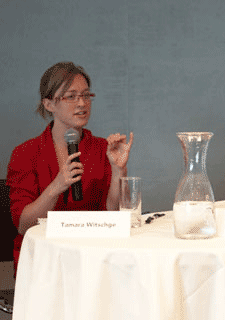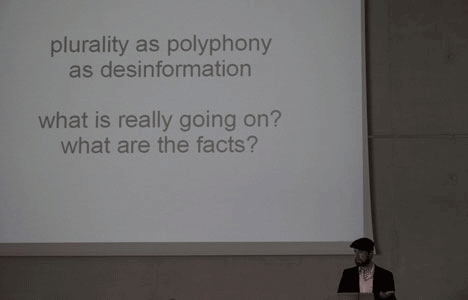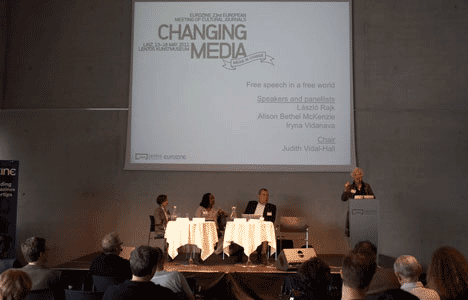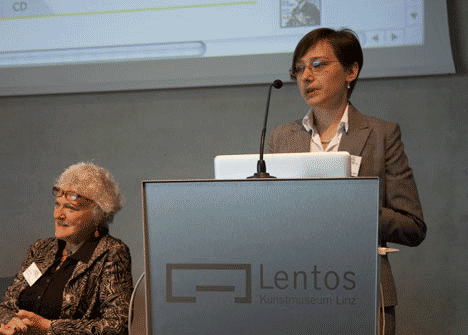The Lentos Kunstmuseum on the banks of Danube in Linz, Austria, provided the backdrop for a weekend of discussion on “changing media”, with over 100 editors, publishers and intellectuals meeting for the 23rd European Meeting of Cultural Journals. Panel discussions and accompanying workshops brought fresh insights to debates on the future of journalism, intellectual property and free speech, and made one thing very clear: independent cultural journals are where reflexion and criticality combine with changing media strategies.

The paradigms of justification for the status quo across the Middle East have been exploded by the mass democratic movements of 2011, according to Khaled Hroub, director of the Cambridge Arab Media project, who opened the conference with an exploration of the links between social-political and media change in the Arab world. The repressive core of developmentalism has been exposed, he said; the post-colonial pretext of re-building has ceased to obscure the democratic failures of hardcore Third-Worldism. The process begun in the mid-1990s when Al Jazeera triggered a boom in Arab broadcast media, albeit subordinated to regional political score-settling. Political taboos had long been broken before the events of 2011, yet the void between the fourth estate and the state power monopoly prevented free speech turning into action. Only when a new generation of media users became actors did this monopoly collapse. The Arab revolutions are a unique opportunity to bridge the gap between the Arab world and the West, argued Hroub. As popular frustration with Obama’s hesitance in Egypt shows, this can only happen if world leaders keep one step ahead of changes in the region, rather than several steps behind.

Do journalists actually believe in the “democratization of the public sphere” brought by the “user-generated content” their own publications often hype? According to research by media scientist Tamara Witschge, who opened a panel session on the future of journalism, journalists continue to view news production as the domain of the expert, and user-generated input primarily as a way to access content. Journalists cite the need to uphold the standards of traditional journalism yet often conceal their own sources, Witschge commented: instead of re-cycling press releases, why not reproduce them wholesale? Radical transparency is the approach used by the online journal Berliner Gazette, where readers’ comments and editorial re-writing are integrated visibly. As BG publisher Krystian Woznicki explained, it is a form of collaborative process-journalism that avoids the myth of the crowd as direct source of new media content.

The one newspaperman on the panel was, surprisingly enough, the most optimistic about traditional journalism’s future. Knut Olav Åmås, culture editor of Norwegian daily Aftenposten, noted that the hyping of social media ignores the fact that most of its ideas stem from the traditional sector. Meanwhile, sales figures indicate that traditional journalism is as solid as never before – at least in Norway. Though journalists are required to spend more and more time on social media platforms, they use these mainly as a source of ideas and feedback. Moderation remains necessary, according to Åmås, even if it is the rationalism of a moderating collective.
The great copyright divide ran through a panel on intellectual property. Pirjo Hiidenmaa, President of the European Writers’ Council, announced that she had yet to hear of any way to ensure authors’ remuneration more effective than the existing copyright system. Hiidenmaa dismissed the “technological imperative”: if it’s technically possible, it must be legal. Protection of copyright for authors is protecting readers, she said: after all, authors need incomes to continue producing content. Leonard Dobusch, expert on community governance at the Free University of Berlin, undermined this argument by pointing out the unequal distribution of copyright earnings, most of which go to a small but wealthy minority. In cultural markets, he explained, the winner-takes-all: a stronger copyright protection will make this situation worse. Felix Stalder, lecturer in digital culture and network theory at the Zürich University of Arts, added that the costs of enforcing copyright might even outweigh the profits. In recent years there has been an explosion of viable alternatives to copyright for funding online creation, from the cultural flat-rate to opt-in systems such as flattr, though it remains to be seen whether and for whom they will work.
A public panel debate very well attended by a regional audience discussed the state of quality media in Austria. Both Armin Thurnher, founder and editor-in-chief of the Viennese weekly Falter, and Barbara Coudenhove-Kalergi, long-time correspondent for central and eastern Europe at the public TV station ORF, blamed the poor development of the media in Austria since 1945 on the absence of liberal revolutions and a bourgeoisie in Austrian history. Above all, however, Austria’s weak media sphere today is the result of the deportation and extermination of the Austrian Jewish intelligentsia. Swiss journalist Stefan Gmünder pointed to the fact that the bourgeoisie in Switzerland invested in media early on and is still supporting newspapers like Neue Zürcher Zeitung, this support being regarded as important for Swiss society and democracy. The aim of the Swedish social model of the 1930s, meanwhile, was to provide equal access to education, according to Arne Ruth, former editor-in-chief of the daily Dagens Nyheter. A newspaper like Expressen, he said, which combines a tabloid approach with high standards of research and journalistic ethics, has been able to reach readers across classes precisely because of this educational policy.

“Words weigh so much, yet they have never been cheaper than on the web,” said Judith Vidal-Hall, introducing a panel on the state of free speech in Europe today. László Rajk, former samizdat publisher and liberal MP, provided a damning indictment of Hungary’s ruling Fidesz party. The irrational notion of Fidesz that they are the “saviours” of the nation in combination with a “rational drive to preserve power” explains their recent assault on the constitution, which had functioned well enough for the last twenty years, said Rajk. The rest of Europe has something to learn from Fidesz’s dual strategy of media repression and de-politicization: throughout Europe, there is a tendency for free-speech to be defended not per sebut on other grounds – artistic freedom for example. The EU promotion of private-public models of media financing also serves to hide state interference in press freedoms, Rajk added.
In Belarus, the matter is far more clear cut: there is no free press and there needs to be one. Iryna Vidanava, founder and editor-in-chief of 34 Multimedia Magazine, described how 15 to 34 year-old Belarusians are the “foot soldiers” of the Belarusian Internet. Yet the typical reader of a news website is a 35 year-old, married, educated, middle class male. Young people are “absent without leave”, just not interested in the news, according to Vidanava. “My colleagues and I feel like we are under siege. We are fighting the good fight with our computers and publications to preserve freedom of expression in Belarus. I hope that very soon we will be able to discuss how independent media helped bring a peaceful victory to the democratic struggle in my country.”

Adding a global perspective to the descriptions of the situations in Hungary and Belarus, Alison Bethel McKenzie, director of the International Press Institute, remarked that while popular consciousness is attuned to war correspondents dying in conflict zones, in many places there’s another no-less-deadly frontline. “It’s a frontline littered with the bodies of journalists whose by-line may not appear on the pages of the world’s most prominent newspapers, and who may not file reports for the world’s most prominent broadcasters, but who are no less heroic, no less committed to the cause of gathering and transmitting news to serve the public interest.”
Texts stemming from the presentations will appear in Eurozine in the coming weeks.